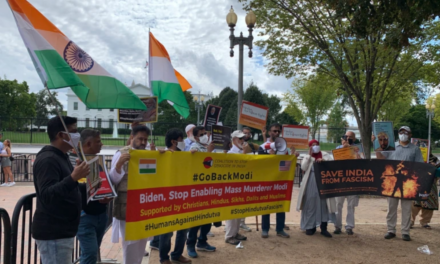Photo Credit: Middle East Eye
Activists of the Ukrainian Association of Muslim Women mark World Hijab Day (AFP)
Thousands of Muslim women have spoken out against a European Union (EU) court ruling issued on Thursday stating that employers can in principle ban staff from wearing hijabs in the workplace.
A ban on religious symbols such as headscarves “may be justified by the employer’s need to present a neutral image towards customers or to prevent social disputes”, the European Court of Justice (ECJ) said in a statement.
The employer must nonetheless show it is not discriminating between different beliefs and religions in its policy, the court said.
The decision means that businesses can fire Muslim women who wear the hijab if they work face-to-face with customers, or if the donning of a religious symbol causes conflicts.
Online, many women said that the court ruling was an example of women’s choice of dress being further policed, and some expressed fears about how the decision would impact their personal and religious freedoms.
A number of people also stood in solidarity with women who choose to wear the hijab, criticising the decision.
The Muslim Association of Britain – an umbrella organisation that represents and supports Muslims, schools, mosques to carry out community projects across the country – called the ruling an example of continuous discrimination.
“Another example of Muslim women being told what they can and cannot wear. This time, the EU’s highest court decides to allow businesses to adopt Islamophobic hiring practices and it is sickening. Enough with this continous discrimination and policing of Muslim women,” the organisation said in a tweet.
Many people have questioned how religious symbols or clothing interfere with someone’s job, calling the decision an example of “legalised discrimination”.
European academics and policy makers launched a “Counter Islamophobia Kit” in 2018, after research in eight countries, including the United Kingdom, France, and Germany, found that there had been a worsening environment of Islamophobia.
Activists and rights groups have long expressed concern that an intense focus on the hijab – often under the guise of policies prohibiting “ostentatious religious symbols” – across Europe was a symptom of normalised anti-Muslim sentiment in some EU countries.
In 2019, the United Nations Human Rights Committee found that France’s niqab ban violated human rights.














